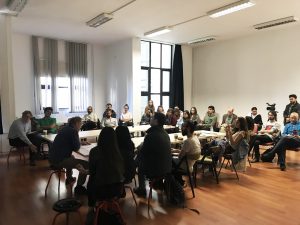BY ÜLKÜ AKKUZU (POLS/III)
 On November 2, Bernhard Serexhe, an art historian, author and independent international curator specializing in electronic and digital art, gave a talk at Bilkent as the guest of the Department of Communication and Design. His topic was “Recoding Humanity: Digital Challenges for Society.”
On November 2, Bernhard Serexhe, an art historian, author and independent international curator specializing in electronic and digital art, gave a talk at Bilkent as the guest of the Department of Communication and Design. His topic was “Recoding Humanity: Digital Challenges for Society.”
From his perspective as an expert on the preservation of digital media art and consultant for international exhibitions and international art institutions, Dr. Serexhe discussed the “recoding” of humanity by digitalization in today’s world. He contended that in this century, people have begun to be “born digital,” and that digitalization in every aspect of our lives has led to the creation of a “digital totalitarian society.” He suggested that to counter this, people should think about how often they really need digital devices, how often they are disturbed by them, even at night, and how they can become more autonomous and independent from such devices.
On the positive side, Dr. Serexhe noted that the public is more aware of the pitfalls of digitalization than they were in the past, citing the tendency in Europe toward skepticism regarding digitalization and the recent drop in the number of Facebook users. On the other hand, he observed, people cannot escape from the effects of this new digital age, perhaps most notably the constant invasion of privacy; we ignore the fact that when we walk down the street, many cameras are watching us pass by.
Dr. Serexhe illustrated his talk with depictions of various devices that violate private life, such as “smart toys” for child surveillance that connect to the internet or record videos. In his view, we are heading toward a situation of total control and a “new humanity.” Providing an everyday example to make his point, he asked, “In the subway, do we see anyone reading a book anymore?” and answered his own question, saying, “Very seldom; everyone is using a smartphone.”
